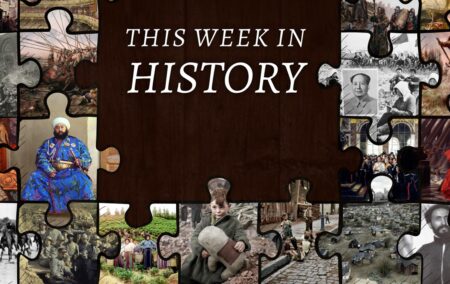15th November 655 – Battle of the Winwaed: Penda of Mercia is defeated by Oswiu of Northumbria

Around the year 400, the Roman Empire withdrew its troops from its northernmost province of Britannia in order to respond to a major crossing of the frozen Rhine River by the Alans, Vandals and Seubi peoples. Very quickly, the Romanized British population and the remaining Celtic population came under relentless attack from raiding peoples – Scoti from Ireland, Picts from Scotland, Saxons and Frisians from the Netherlands and Germany and Jutes and Angles from Denmark.
The local defenders of the Roman province were completely outmatched by their attackers and requested reinforcements from the Roman Emperor, but were simply told to look to their own defences. Britain disintegrated into a patchwork of petty kings who defended their local area from raids and from one another. The archaeological record shows that over the next 200 years the British Isles entered a true dark age with the economy collapsing and the material wealth of the British population markedly decreasing.

According to legend (and thus difficult to confirm or refute due to the lack of sources about the period), one of the petty British kings hired a group of Germanic mercenaries, probably Saxons, to fight off the raids by Picts from the north. It is told that, having been very successful in their efforts, and realising how powerful they were, the mercenaries turned their attention to their British hosts and subjugated them. Whatever the truth, sometime in the 400s Angles, Frisians, Jutes and Saxons (Germanic peoples) began to invade the British Isles, particularly the region we now call England.
The number of these invaders, and the settlers who followed them, is hotly debated by historians. Some believe that only a small number of Germanic people arrived in the region and established themselves as a warrior elite and that their Celtic- and Latin-speaking subjects adopted the culture of their rulers over time and eventually began to see themselves as Germanic people as well. The evidence for this is that there is no clear cultural break in the way people lived in the archaeological record before the Germanic invasion.
Another theory, based largely on ancient sources, suggests that the local British population was slaughtered, displaced or simply fled the invaders and that the land they left behind was settled by large numbers of the Germanic peoples. There is some evidence for this in linguistics, such as the relative lack of influence from Celtic languages on English and the fact that genetic studies have found that people on the east coast of the British Isles have significant genetic ancestry from Denmark, Norway and Germany. However, a deeper reading of the genetic evidence may also indicate that while many settlers arrived, they did not displace the local Britons and rather mixed with them, converting the locals to their culture over time.
Yet another theory is that only a small warrior elite arrived, but due to their position of power in society they simply outbred the locals, as they could have and support more children and wives and often killed men and raped local women. This theory was dominant for a time but has fallen somewhat out of favour with many historians, although is still favoured by some.
Whatever the truth, by the 600s most of the region known today as England (from Angleland or land of the Angles) was dominated by a Germanic culture known as Anglo-Saxon culture. The Anglo-Saxons by the 600s had formed six kingdoms in the area of modern England, with the most important being Northumbria, Mercia, Wessex and Kent. The British Isles had been mostly Christian when the Anglo-Saxons arrived, but these Christian communities had become increasingly isolated from the wider Christian world over time and by the 600s were quite distinct.
By that time the Christians had also been driven into the Celtic-speaking areas like Wales, Ireland and Scotland while the Anglo-Saxons retained their pagan faith they had brought from Germany – a type of paganism similar to that of the later Vikings – and this dominated in England.
Around the year 597, Pope Gregory in Rome sought to establish a connection with the Christian churches in the British Isles and hopefully re-Christianise England, and so sent groups of missionaries to the Anglo-Saxons.

These missions were successful and soon many of the Anglo-Saxon kings converted to Christianity. The king of Mercia however, a man known as Penda, did not convert, and during the mid-600s (all dates in this period are uncertain), established himself as the most powerful of all the Anglo-Saxon kings after killing King Edwin of Northumbria in 633.
After years of dominance, he would eventually be challenged by a Christian king of Northumbria, a man named Oswiu. Penda cornered Oswiu in a fortress and managed to extract a large tribute in treasure from him. Penda then gathered his army and began to march home. On the way, however, as they neared a river, they were attacked from behind by Oswiu. Despite being heavily outnumbered, the Northumbrians drove Penda’s army into flight, and many drowned in the river attempting to flee. Penda and his ally, the King of East Anglia, both died in the battle and Northumbria emerged as the dominant power of England.
Penda’s death marked the end of Germanic paganism among the Anglo-Saxons and his sons would soon convert to Christianity. Christianity would entirely wipe out paganism –until it was reintroduced by Viking settlers in the mid-800s.
If you like what you have just read, support the Daily Friend

